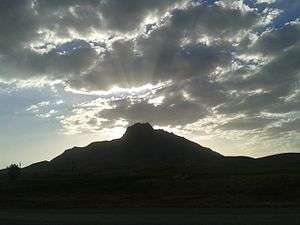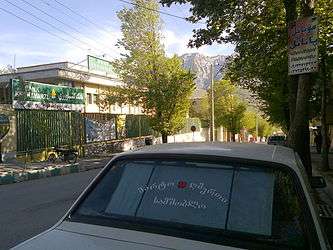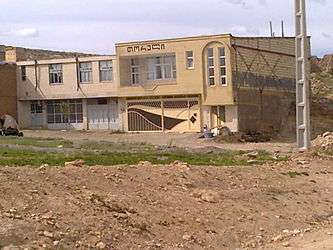Fereydan

Fereydan (Persian: فریدن, Georgian: ფერეიდანი, Armenian: Փերիա) is a region of Isfahan Province, Iran.
Georgians in Fereydan


The Fereydan Georgians (Georgian: ფერეიდნელები) are an ethnographic group of the Georgian people who mostly live in the city of Fereydunshahr and in the Fereydan region of Iran.
Origins
Although there had been Georgians both been carried off forcefully and to a lesser extent voluntarily moved since the time of shah Tahmasp I, the large Georgian community in Iran has most of its roots starting from shah Abbas I his ruling era. During the Persian punitive campaign in eastern Georgia by Shah Abbas in 1614–16 against his formerly most loyal Georgian subject Teimuraz I, the region of Kakheti and the city Tblisi were both devastated, and extremely large amounts of its population forced into exile. In total, just after Shah Abbas' his return to Persia in 1616 after ending the campaign victoriously, about 200,000 ethnic Georgians from Kakheti were expelled to Isfahan province, the Fereydan county, and other regions in mainland Persia, such as in the north (present day Mazandaran province, Gilan province). Under the forced labor,[1] Georgians constructed bridges and organized the rehabilitation of the farmlands in the Fereydan valley.[2] Since the forced migration, Persianization, and islamisation, few of the Fereydan Georgians had any contacts with their motherland. However, they managed to maintain the Georgian language, which they call Pereidnuli (and is intelligible with East Georgian dialects). Today, Fereydan Georgians are (100,000 +). The total amount of Iranian Georgians in the country or those Iranians with Georgian ancestry constitute a far greater amount, exceeding millions, and descend from the massive Georgian migrational waves between the 16th and course of the 19th centuries.
Georgians are natives in:
- Fereydunshahr (Georgian city, County Center)
- Sibak (Georgian village)
- Choqyurt (Georgian and Lurish village)
- Nehzatabad (Georgian and Lurish village)
- Buin va Miandasht (Georgian city, County Center)
- Afus (Georgian city)
- Dashkasan (Georgian village)
- Aghche (Georgian village)
Armenians in Fereydan
Fereydan (or Peria) was and still is populated by Armenians who were brought to this part of Iran by Shah Abbas of Safavid dynasty in 1603 and 1604, following the Nakhchivan deportations.
The following is a list of villages inhabited by Armenians, which were part of Fereydan:
Fereydan's Cultural Heritage
More than 340 historical sites have been discovered in Fereydan County, 10 of which have been registered on the national heritage list. On Jan. 3, Head of Cultural Heritage of Fereydan County announced the discovery of an underground city at the foot of Fereydan which belongs to Achaemenid era.[3]
See also
References
- ↑ Muliani, S. (2001) Jaygah-e Gorjiha dar Tarikh va Farhang va Tammadon-e Iran. Esfahan: Yekta [The Georgians’ position in the Iranian history and civilization]
- ↑ Muliani, S. (2001) Jaygah-e Gorjiha dar Tarikh va Farhang va Tammadon-e Iran. Esfahan: Yekta [The Georgians’ position in the Iranian history and civilization]
- ↑ Underground Achaemenid city discovered in Fereydan
External links
- (Georgian) Fereydan - Little Georgia
| Wikimedia Commons has media related to Fereydan. |








